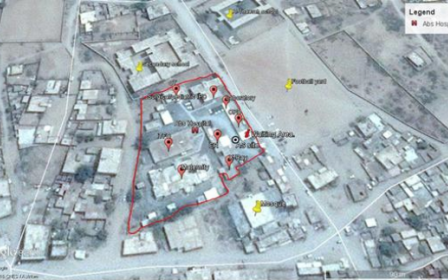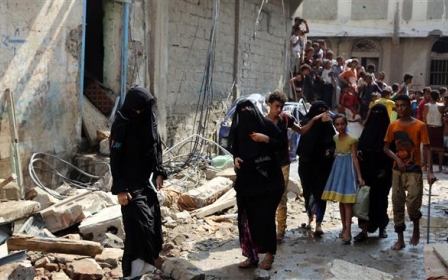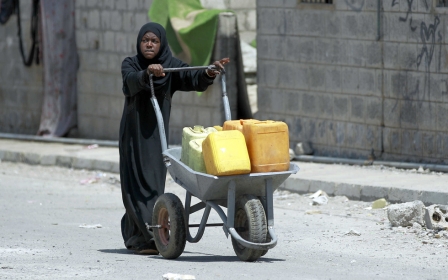The American-made catastrophe in Yemen
For a generation of Americans old enough to remember, the Korean conflict is often dubbed the “forgotten war”. Where Hollywood has lionised or contextualised those who fought in the Second World War and Vietnam, the nearly 2 million Americans who fought on the Korean peninsula in the early 1950s have largely been airbrushed from history.
Fast forward 60 odd years, and Americans find themselves participating in yet another forgotten war: Yemen.
Where the unfolding tragedy in Syria has grabbed media attention in the US over the course of the past five years, at least intermittingly, America’s participation and contribution towards alleged war crimes and the unmitigated humanitarian crisis in Yemen is yet to have even grabbed the attention of CNN’s scrolling news ticker.
Effectively what this means is this: the US mainstream media is choosing to broadcast to US viewers news stories that reflect only the geopolitical positions of the US administration. While this is hardly breaking news or some kind of deep revelation, given how US media behaved as cheerleader-in-chief for the 2003 invasion of Iraq, it’s still worth noting.
Double standards
For instance, when Russia bombs an aid convoy, attacks a hospital or a school in Syria, a spokesperson for the US administration will come forward to denounce Russia’s intervention, and the media will cover it. But when US taxpayer bombs, using US military guidance systems, blow up wedding parties, schools, anything, you can cut the silence with the proverbial knife.
Where John Kerry condemned Russia’s attack on the aid convoy, and was reported by most major media outlets, the US-led attack against civilians in Yemen went widely unnoticed
On the same weekend The New York Times ran a full-page article on how Russia attacked 31 humanitarian aid trucks, killing 18 civilians, on the outskirts of Aleppo, Syria, US fighter jets fired missiles into five residential homes in Hudaida province, Yemen, killing 26 civilians.
Where US Secretary of State John Kerry condemned Russia’s attack on the aid convoy, calling for an immediate grounding of all Russian warplanes so that aid deliveries could continue, which was reported by most major media outlets, the US-led attack against civilians in Yemen went widely unnoticed.
Sorry – my bad – the US government did make an announcement on Yemen that very same day: “Senate clears way for $1.15 billion arms sale to Saudi Arabia.” Which now means Obama has shipped more weapons to Saudi Arabia than any previous US president, taking the kingdom’s haul to an eye-popping $115 billion since 2009.
Human catastrophe
These weapons have inflicted an almost unimaginable human catastrophe on the people of Yemen. That is, unimaginable only if you hadn’t heard of the parallel catastrophe in Syria. Since the start of 2015, the Saudi-US intervention in Yemen has resulted in the deaths of more than 10,000 people, most of them civilians, alongside another three million who have been displaced from their homes, and another 21 million in urgent need of humanitarian aid.
It’s also interesting to note that, at the same time senior US officials call for the enforcement of a no-fly zone in Syria in order to protect civilians, the US-Saudi coalition is also carrying out air strikes in Yemen that are killing civilians.
At the same time senior US officials call for the enforcement of a no-fly zone in Syria in order to protect civilians, the US-Saudi coalition is also carrying out air strikes in Yemen that are killing civilians
If Saudi Arabia’s relentless attack on Yemen was underwritten by Russia, instead of the US, it’s likely Americans would know more about the human suffering taking place in this country. But it’s not, and thus they know less, not more.
In September, a report compiled by the Yemen Data Project found that more than third of US-Saudi airstrikes have struck civilian sites – including hospitals, schools, mosques, and government buildings.
The report noted that of 8,600 air strikes carried out between March 2015 and August 2016, 3,577 hit military sites, while 3,158 struck non-military targets. While the report says some of these attacks on civilian targets can be attributed to “mistakes,” the fact repeated air strikes have struck schools, hospitals and mosques points to a more sinister conclusion.
Media silence on arms bonanza
Where US complicity in alleged war crimes have been met with total media silence in the United States, there is growing pressure on the European Union and the United Nations, led by The Netherlands, to investigate Britain’s contribution in the conflict.
Britain has sold nearly $5bn worth of arms to Saudi Arabia since the conflict began, and in the meantime the UK government has blocked a UN inquiry into the claim of war crimes in Yemen.
Britain has sold nearly $5bn worth of arms to Saudi Arabia since the conflict began, and in the meantime the UK government has blocked a UN inquiry into the claim of war crimes in Yemen
Several human rights groups, including Human Rights Watch, recently penned an open letter to the UN Commissioner on Human Rights that demands an international inquiry to “establish facts, collect and preserve information related to violations and abuses with a view to ensuring that those responsible for crimes are brought to justice in fair trials".
The UK government’s attempt to block an international inquiry into Saudi-US coalition war crimes in Yemen has been derided by human rights groups. “It’s shocking. The UK ought to be standing up for justice and accountability, not acting as a cheerleader for arms companies,” said Polly Truscott of Amnesty International. While Andrew Smith of Campaign Against Arms Trade observes: “For 18 months now, UK arms have been central to the destruction of Yemen.”
Dog days of the Obama doctrine
Muted criticism of the United States’ role in Yemen, however, is centred less on the plight of Yemen’s internationally forsaken citizens, and fixated more on what Yemen means for the endurance of the Obama Doctrine. In other words, Yemen is seen merely through the prism of a political football, and not a moral balance.
Where the Bush Doctrine urged preemption and direct military involvement, the Obama Doctrine favours the outsourcing of war to regional allies, but outsourcing to Saudi in Yemen has left many US administration officials wondering whether a lack of US due diligence in mitigating against civilian casualties is exacerbating casualties in a conflict already mired in a stalemate.
It's disturbing to learn that Obama has determined Yemen to be a problem unworthy of a solution, dismissing the country as a 'complete shit show'
“Obama has said little about the war in Yemen. With mere months left in his presidency, there is scarce indication that he will,” notes The Atlantic. “Increasingly skeptical of America’s ability to shape events on the ground in the Middle East, Obama sees little incentive to overturn the status quo, even if that means supporting the apparently reckless military forays of a government he disdains.”
Not only is it extraordinary that Obama has been forced to say very little about a conflict in which US involvement has led to an almost unrivalled human catastrophe, but it’s equally disturbing to learn that Obama has determined Yemen to be a problem unworthy of a solution, dismissing the country as a “complete shit show,” according to one US official who briefs the president on national security matters.
Yes, Yemen is a “shit show” but it is a “shit show” that is exacerbated by a US-backed coalition, and it’s a only a US-backed coalition that can bring an end to a “shit show” that has led to the deaths of 10,000 Yemenis and the pending doom of tens of millions more.
- CJ Werleman is the author of Crucifying America, God Hates You. Hate Him Back, Koran Curious, and is the host of Foreign Object. Follow him on twitter: @cjwerleman
The views expressed in this article belong to the author and do not necessarily reflect the editorial policy of Middle East Eye.
Image: An eight-year-old malnourished boy lies on a bed in the emergency ward of a hospital in Sanaa, Yemen 27 September 2016 (Reuters)
This article is available in French on Middle East Eye French edition.
Middle East Eye propose une couverture et une analyse indépendantes et incomparables du Moyen-Orient, de l’Afrique du Nord et d’autres régions du monde. Pour en savoir plus sur la reprise de ce contenu et les frais qui s’appliquent, veuillez remplir ce formulaire [en anglais]. Pour en savoir plus sur MEE, cliquez ici [en anglais].





